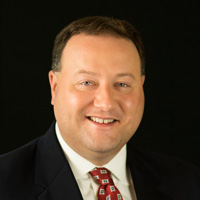Should You Add A Robo-Adviser To Your Financial Team?
Diversification is always a good idea. And one way to do that could be to diversify how you get your advice.


Profit and prosper with the best of Kiplinger's advice on investing, taxes, retirement, personal finance and much more. Delivered daily. Enter your email in the box and click Sign Me Up.
You are now subscribed
Your newsletter sign-up was successful
Want to add more newsletters?

Delivered daily
Kiplinger Today
Profit and prosper with the best of Kiplinger's advice on investing, taxes, retirement, personal finance and much more delivered daily. Smart money moves start here.

Sent five days a week
Kiplinger A Step Ahead
Get practical help to make better financial decisions in your everyday life, from spending to savings on top deals.

Delivered daily
Kiplinger Closing Bell
Get today's biggest financial and investing headlines delivered to your inbox every day the U.S. stock market is open.

Sent twice a week
Kiplinger Adviser Intel
Financial pros across the country share best practices and fresh tactics to preserve and grow your wealth.

Delivered weekly
Kiplinger Tax Tips
Trim your federal and state tax bills with practical tax-planning and tax-cutting strategies.

Sent twice a week
Kiplinger Retirement Tips
Your twice-a-week guide to planning and enjoying a financially secure and richly rewarding retirement

Sent bimonthly.
Kiplinger Adviser Angle
Insights for advisers, wealth managers and other financial professionals.

Sent twice a week
Kiplinger Investing Weekly
Your twice-a-week roundup of promising stocks, funds, companies and industries you should consider, ones you should avoid, and why.

Sent weekly for six weeks
Kiplinger Invest for Retirement
Your step-by-step six-part series on how to invest for retirement, from devising a successful strategy to exactly which investments to choose.
Popular culture often takes an “us vs. them” attitude toward technology.
Think about the menacing messages of 2001: A Space Odyssey, Blade Runner or Terminator.
Machines are bad and want to take over; people are good and must control them.
From just $107.88 $24.99 for Kiplinger Personal Finance
Become a smarter, better informed investor. Subscribe from just $107.88 $24.99, plus get up to 4 Special Issues

Sign up for Kiplinger’s Free Newsletters
Profit and prosper with the best of expert advice on investing, taxes, retirement, personal finance and more - straight to your e-mail.
Profit and prosper with the best of expert advice - straight to your e-mail.
In real life, though, technology isn’t nearly so scary — unless, of course, you’re worried a robot will take away your job.
I’m not. Though some may see the growing popularity of so-called “robo-advisers” as a threat to financial professionals, I’m embracing this method of investing as a way to further diversify a client’s portfolio and look out for his or her best interests.
Typically, when advisers talk about diversification, they mean taking a broad approach to the products we invest in: stocks, bonds and mutual funds, commodities, real estate, etc. But we also can diversify our portfolios by looking at how we arrive at our investment decisions — and algorithm-based investing offers another opportunity to do that.
It’s a complement to what investors and their financial advisers do — not a substitute. In this form of investment diversity, you have the computer, the money manager and the actual account holder all making choices, but doing it different ways.
And my clients love it. It’s probably the most popular thing we do, because it takes the emotional angst out of day-to-day financial decision making. The program we use has been around for 15 years, and we’ve been using it for three.
Taking emotions out of the way
People realize their decisions are sometimes going to be wrong. They’re often based on emotions — greed, fear, pride, regret — which can lead to buying high and selling low. And though an adviser’s recommendations are much more objective (especially if the adviser is a fiduciary), we can also sometimes miss the mark.
The computer — though emotionless and completely objective — can be wrong, too. But with three parties making decisions, we can limit the chances of everything being wrong at the same time.
Here’s an example of human vs. robo investing:
Let’s say your favorite burger chain puts out a press release that says in the first quarter it sold more of its popular namesake burgers than ever before. You might think, “Wow! Big Jack’s Burgers is doing great. I’m going to get in on that success and buy some stock.”
That’s a decision based on emotion.
But the computer doesn’t really care how many Big Jacks were sold — after all, they could have been selling burgers for a penny, just to hit a number. The computer looks at all the data — revenue and expenses, trends and statistics. And, based on certain triggers, it might decide to buy some Big Jack’s shares, or it might decide that because other people responded emotionally, the stock is overbought and now would be a good time to sell.
Meanwhile, your adviser might suggest something completely different that’s a better, safer, less expensive way to go.
Putting robos to work for you
Two or three heads are better than one — even if (or maybe especially if) one of them “thinks” in code. Robo-advisers are largely programmed for growth, meaning they will use fancy algorithms and a computational approach to help clients grow their investments. If someone has money set aside just earmarked for growth, money they are comfortable taking an aggressive approach with, that might be well-suited to management via a robo-adviser. This approach is especially complementary to a buy-and-hold strategy with active human management, because your more aggressive investments won’t be subject to higher trading fees and will be counterbalanced by more conservative strategies that have an actual — as opposed to virtual — eye on them.
There are numerous ways for you to integrate this approach with your (human) financial adviser — perhaps this is a service they already offer, or perhaps it is a matter of giving them the ability to access and monitor an app-based or online strategy. No matter what specific integration approach you use, a true adviser has a fiduciary duty to explore the most appropriate investments for their clients. Nowadays, this certainly can mean robo-advising and the low fees associated with it. An adviser’s reluctance or outright refusal to include any robo-advised assets or their failure to otherwise research a variety of alternate options is not consistent with a fiduciary duty, and would keep them from being able to give you a true comprehensive look at your portfolio.
Will robo-advisers replace human advisers? Maybe, someday, when it comes to the investing piece of what we do. It’s efficient and effective.
But robo-investing has its limits. It can’t — or shouldn’t — perform the other tasks we manage for our clients as part of a comprehensive financial plan. Particularly for those nearing or in retirement, the kind of income, tax and legacy planning we do is essential.
Robo-investing is a tool. Or maybe, to take it a step further, a valued member of the team. Instead of fighting the future, we’re working cooperatively with it.
Kim Franke-Folstad contributed to this article.
Profit and prosper with the best of Kiplinger's advice on investing, taxes, retirement, personal finance and much more. Delivered daily. Enter your email in the box and click Sign Me Up.

Michael R. Andersen is the founder and president of Andersen Wealth Management, a Registered Investment Adviser. He is an Investment Adviser Representative and a licensed fiduciary. A firm believer in financial education, Andersen holds regular informational seminars for clients and the community, and he is the host of the "Wise Money" radio show.
-
 Over 65? Here's What the New $6K 'Senior Deduction' Means for Medicare IRMAA Costs
Over 65? Here's What the New $6K 'Senior Deduction' Means for Medicare IRMAA CostsTax Breaks A new deduction for people over age 65 has some thinking about Medicare premiums and MAGI strategy.
-
 U.S. Congress to End Emergency Tax Bill Over $6,000 Senior Deduction and Tip, Overtime Tax Breaks in D.C.
U.S. Congress to End Emergency Tax Bill Over $6,000 Senior Deduction and Tip, Overtime Tax Breaks in D.C.Tax Law Here's how taxpayers can amend their already-filed income tax returns amid a potentially looming legal battle on Capitol Hill.
-
 5 Investing Rules You Can Steal From Millennials
5 Investing Rules You Can Steal From MillennialsMillennials are reshaping the investing landscape. See how the tech-savvy generation is approaching capital markets – and the strategies you can take from them.
-
 When Estate Plans Don't Include Tax Plans, All Bets Are Off: 2 Financial Advisers Explain Why
When Estate Plans Don't Include Tax Plans, All Bets Are Off: 2 Financial Advisers Explain WhyEstate plans aren't as effective as they can be if tax plans are considered separately. Here's what you stand to gain when the two strategies are aligned.
-
 Counting on Real Estate to Fund Your Retirement? Avoid These 3 Costly Mistakes
Counting on Real Estate to Fund Your Retirement? Avoid These 3 Costly MistakesThe keys to successful real estate planning for retirees: Stop thinking of property income as a reliable paycheck, start planning for tax consequences and structure your assets early to maintain flexibility.
-
 I'm a Financial Planner: These Small Money Habits Stick (and Now Is the Perfect Time to Adopt Them)
I'm a Financial Planner: These Small Money Habits Stick (and Now Is the Perfect Time to Adopt Them)February gets a bad rap for being the month when resolutions fade — in fact, it's the perfect time to reset and focus on small changes that actually pay off.
-
 Social Security Break-Even Math Is Helpful, But Don't Let It Dictate When You'll File
Social Security Break-Even Math Is Helpful, But Don't Let It Dictate When You'll FileYour Social Security break-even age tells you how long you'd need to live for delaying to pay off, but shouldn't be the sole basis for deciding when to claim.
-
 I'm an Opportunity Zone Pro: This Is How to Deliver Roth-Like Tax-Free Growth (Without Contribution Limits)
I'm an Opportunity Zone Pro: This Is How to Deliver Roth-Like Tax-Free Growth (Without Contribution Limits)Investors who combine Roth IRAs, the gold standard of tax-free savings, with qualified opportunity funds could enjoy decades of tax-free growth.
-
 One of the Most Powerful Wealth-Building Moves a Woman Can Make: A Midcareer Pivot
One of the Most Powerful Wealth-Building Moves a Woman Can Make: A Midcareer PivotIf it feels like you can't sustain what you're doing for the next 20 years, it's time for an honest look at what's draining you and what energizes you.
-
 I'm a Wealth Adviser Obsessed With Mahjong: Here Are 8 Ways It Can Teach Us How to Manage Our Money
I'm a Wealth Adviser Obsessed With Mahjong: Here Are 8 Ways It Can Teach Us How to Manage Our MoneyThis increasingly popular Chinese game can teach us not only how to help manage our money but also how important it is to connect with other people.
-
 Looking for a Financial Book That Won't Put Your Young Adult to Sleep? This One Makes 'Cents'
Looking for a Financial Book That Won't Put Your Young Adult to Sleep? This One Makes 'Cents'"Wealth Your Way" by Cosmo DeStefano offers a highly accessible guide for young adults and their parents on building wealth through simple, consistent habits.